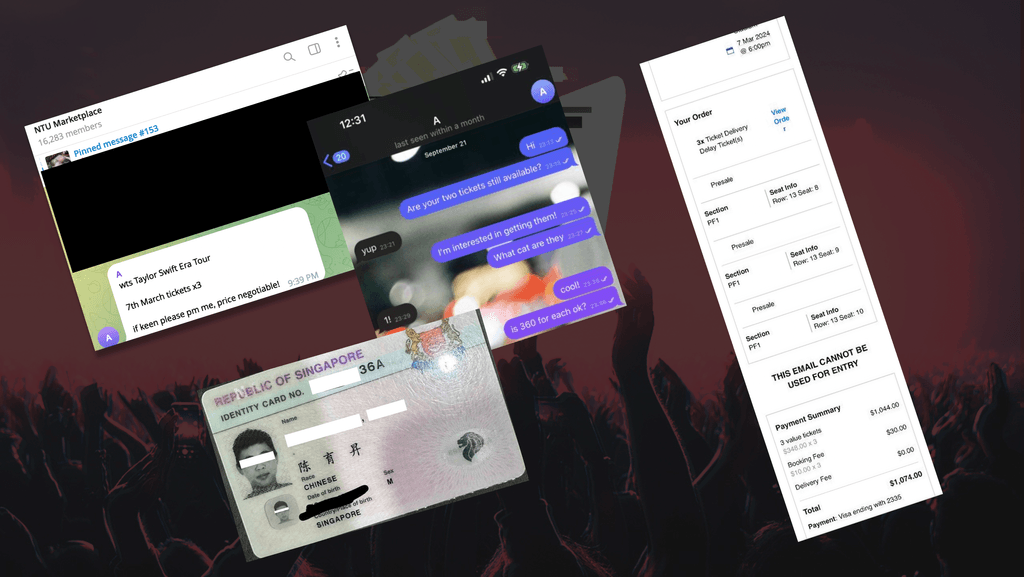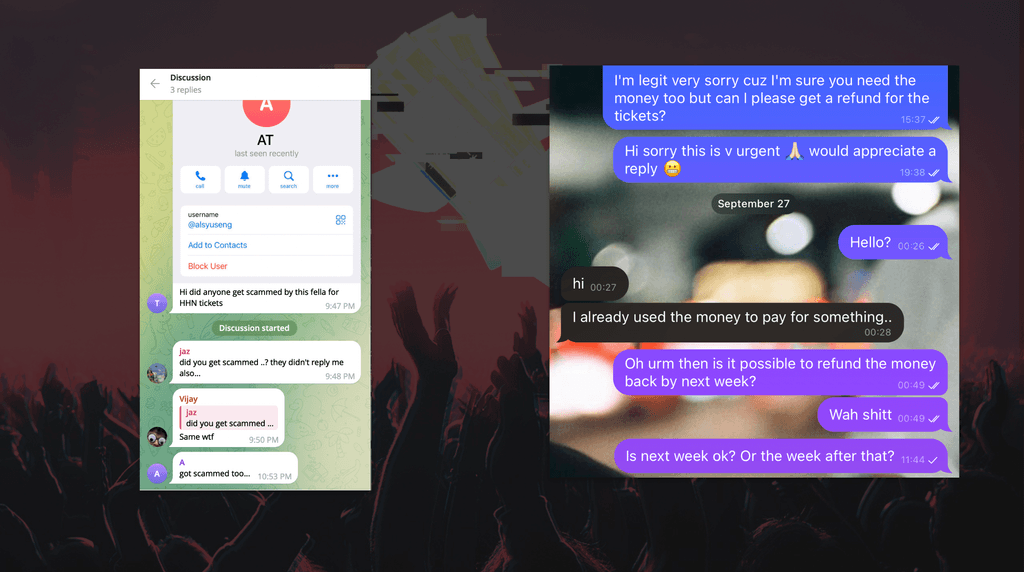SUMMARY
This is AI generated summarization, which may have errors. For context, always refer to the full article.

SINGAPORE – “That’ll never be me. I’ll never get scammed.”
Young and technologically savvy, Rachel a 21-year-old student at Singapore’s Nanyang Technological University (NTU), thought scam victims are mostly older people. This was until she lost S$750 (P31,349)* while trying to buy concert tickets to Taylor Swift’s The Eras Tour in Singapore.
To date, Rachel has not recovered a single cent nor heard from the scammer. Her losses, while unfortunate, are but a drop in the bucket if compared to the total amount scammed in relation to Swift’s concerts, or concerts in general, that have been reported so far.

For The Eras Tour March 2024 concert alone, at least 54 victims were duped by scammers pretending to sell tickets after they went on sale. In less than a week in July 2023, Singapore Police Force (SPF) reported losses from scams amounting to S$45,000 (P1.8 million).
At least 522 online scams related to concert tickets took place in the six months between January 1 and July 10, 2023, with total losses amounting to at least S$518,000 (P21.6 million).
What enables these scams? Social media platforms, according to the Singapore Police Force (SPF).
Scammers hook victims by falsely advertising the sale of concert tickets using listings on social media and e-commerce platforms, such as Telegram, X (formerly known as Twitter), Facebook, and Xiaohongshu.
Of these platforms, Telegram – currently one of the top 5 messaging apps worldwide – is becoming the scammers’ platform of choice. Most concert ticket scams in January 2024 involved listings on the encrypted messaging app, a police advisory said. They attributed this to a combination of young, die-hard fans eager to meet their favorite artists and the popular use of Telegram among this generation.
This writer tried to reach out to Telegram through publicly available contact information. Telegram has not responded to requests for comment.
A marketplace for students
What makes the app conducive to shady deals? It is features that combine privacy measures with the ability to allow users to anonymously reach the public.
For many Telegram users, the encrypted messaging app is a way to privately communicate with peers about sensitive topics. But Telegram also has a built-in search bar that anyone can use to easily search for channels and public groups.
Experts say this allows criminals to reach the public. Vice versa, this also allows the public to access groups which may eventually turn out to be involved in criminal activities.
This was the case for the Telegram group where Rachel met her seller. It can easily be found using the search bar. Rachel came across the seller who scammed her through the Telegram group, NTU Marketplace.

The group previously functioned as a marketplace where students from her university buy, sell, and trade their items. NTU Marketplace has more than 17,000 members as of writing. While the group is meant for NTU students, it is open to the public. Messages or listings on the group date back to as early as June 29, 2021.
Rachel, who works as a part-time barista while juggling a rigorous school curriculum, never intended to attend Swift’s concerts. She spent her childhood listening to Swift’s songs and really wanted to see the singer up close. But she knew she would not stand a chance in the “great war” for tickets.
On September 21, 2023, however, Rachel saw another member of NTU Marketplace post a message that said they wanted to let go of a pair of tickets for Swift’s concerts. Her interest piqued, Rachel decided to reach out privately to the user, who uses the handle @Alnsh31, on Telegram.
It sounded like a good deal: S$750 for two tickets that originally cost S$696, or P29,123*.
Knowing that scams abound online, Rachel took extra precautions. She asked the seller to send her a picture of his Identification Card (IC). This is so she had the needed details to report to the police, if necessary. She paid the seller only after receiving a picture of the IC, as well as a screenshot of the order receipt for the concert ticket.

These precautionary measures, it turned out, were not enough. Rachel never received the actual tickets, which were emailed by organizers to ticket buyers two weeks before the concert. She later learned that an individual whose name is similar to the one who sold her the tickets had also scammed users in other Telegram groups.
Unable to watch the Taylor Swift concert, Rachel begged the user to send her money back. Her pleas were all in vain. The scammer merely deleted the Telegram account he used to bait her.
Exploiting privacy
Scams on Telegram go beyond concert tickets. Local authorities said they have noticed an increasing trend of criminal activity, such as illicit drug transactions and job scams, on Telegram.
The popular messaging app, it seems, has evolved to serve as a bridge connecting criminals with their unsuspecting victims.

Telegram was at the center of most of the drug and sexual offense cases that he represents, Singapore lawyer Raphael Louis (Ray) told this writer in an interview over Zoom.
Louis specializes in criminal litigation representing both victims and offenders. His clientele includes many young people. Most of the clients of Louis who have been involved in drug offenses used Telegram to source for and/or sell drugs.
A number of features make Telegram appealing to people who are cautious about electronic monitoring.
First, the messaging app allows its users to hide their numbers, thus concealing their identity.
While this feature is also available in other apps, Telegram went a step further by making it possible for people to acquire virtual phone numbers through Fragment, a blockchain technology the company also developed.
A post on Telegram’s blog promotes the use of Fragment as a way to further protect user privacy by making it possible for users to open Telegram accounts without the need of a SIM card, a personal number, or an active phone line.
The one time pin is only required so that it can receive a one-time pin (OTP) while creating the account. Once created, the number may be disposed of.
Because users do not need a SIM card, a personal number, or an active phone line to register on Telegram, it is very easy to create multiple Telegram accounts.
Telegram also has end-to-end encryption, which means third parties, and even Telegram, cannot access the data communicated on its platform.
Additionally, Telegram allows users to delete their accounts and messages. It is even possible to delete entire chat histories for both sender and receiver.
Deleting messages is also allowed in other messaging apps. But Telegram makes deleted messages disappear without leaving any visible sign that something was removed.
By comparison, on Signal, a sender can only delete for himself or herself. It is not possible to delete the copy already received by the receiving user’s device.
On WhatsApp, deleting for both sides is only possible within two days after the messages are sent. There is also an indicator that shows that a message was deleted. On Messenger, the choices are: delete for yourself or unsend if you want to remove the message from the receiver’s chat. But again, the app still shows an indicator that a message was unsent.
Once messages are deleted, it is hard to hold users accountable for those they sent through Telegram.
These privacy features can be exploited by those involved in criminal activity, Siraj Shaik Aziz, a counsel and criminal defense lawyer from Silvester Legal LLC, told this writer via an email interview.
Beyond this, Telegram also employs a strict privacy policy that forbids the company from sharing user information with law enforcement agencies. The company’s ethos is: privacy trumps all.
In an interview in 2015, roughly two years after the messaging app was launched, Telegram founder Pavel Durov, confirmed to TechCrunch’s Mike Butcher that terrorist group ISIS is indeed using Telegram. Asked if he sleeps well at night knowing that terrorists are using his platform, Durov responded: “I think that privacy, ultimately, and our right for privacy is more important than our fear of bad things happening, like terrorism.”
The anonymity that Telegram offers its users, Louis said, is the primary reason why it is the platform of choice for scammers and offenders.
Law enforcement challenge
Rachel has given up all hopes of recovering her money. She treats this episode as an expensive lesson learned. She has reported the user who scammed her to the police but has yet to hear back from them.
Not only is it hard to hold scammers on Telegram accountable. It is also hard to hold Telegram accountable or get it to cooperate with authorities for criminal activities carried out on its platform, Siraj said.
Founded in Russia, Telegram is now headquartered in Dubai, United Arab Emirates – away from the reach of Singapore (and other countries’) law enforcement.
In November 2023, K Shanmugam Minister in charge of Singapore’s Ministry of Law and Ministry of Home Affairs reported to Parliament that Telegram did not respond when the police flagged for removal more than 5,900 online accounts and advertisements involved in suspected scams.
Malaysia also faced the same predicament, Siraj said. Malaysia’s Communications and Digital Minister Fahmi Fadzil said they received many complaints regarding Telegram’s content and misuse of the application. Illicit activities ranged from the sale of pornographic materials to drugs and investment scams. Telegram did not take action in all these cases.
Instead, its spokesperson, said that it refused to cooperate with Fahmi’s ministry as the platform did not want to participate in “any form of political censorship.”
New Singapore law
In a bid to hold Telegram, as well as other online platforms accountable, the Singapore parliament passed the Online Criminal Harms Act (OCHA) 2023 on July 5, 2023.
The OCHA law allows the Singapore government to issue directions to users, online service providers, and/or internet service providers. For instance, government may compel a user to issue a correction.
It also allows the government to block communication and access to specific content in Singapore, or to block access to the application entirely.
The new law took effect in February 2024. This means the Singapore government could already invoke it if online platforms such as Telegram are not cooperative, said Cory Wong, a criminal defense lawyer and director of Invictus Law Corporation. He noted, however, that the Singapore government has so far refrained from taking such drastic measures.
Meantime, Singapore authorities advise the public to take precautionary measures when transacting online. Talking about concert scams, Minister of State for the Ministry of Home Affairs Muhammad Faishal Ibrahim said, “ultimately, the best defense against scams is a discerning public.” – Rappler.com
Fiona Tan, affiliated with Mothership in Singapore, is a #FactsMatter Journalism Fellow for 2023-2024.
*1 Singapore $ = P42.38 at the time of writing
Add a comment
How does this make you feel?









There are no comments yet. Add your comment to start the conversation.